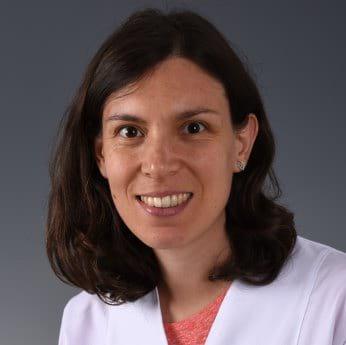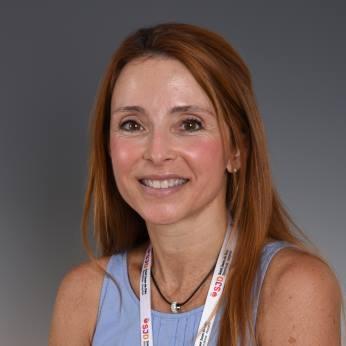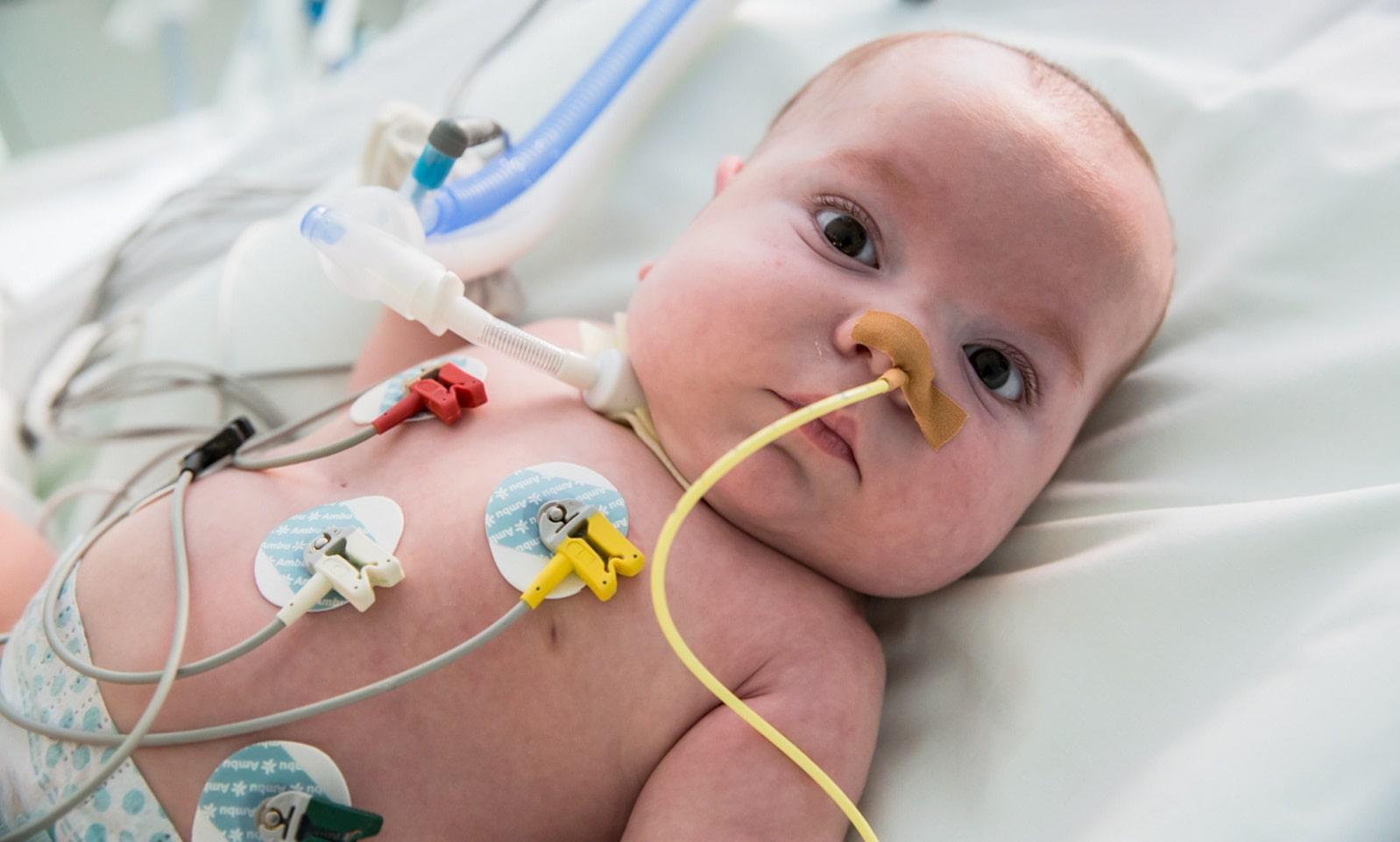
The Pediatric Intensive Care Unit (ICU) at SJD Barcelona Children's Hospital treats children with serious problems that require complex monitoring and treatment
The Pediatric Intensive Care Unit (ICU) at SJD Barcelona Children's Hospital treats children with the most serious illnesses. The ICU consists of a medical and nursing team and assistants with solid training and specialisation in pediatric intensive care. Our technologically advanced facilities allow us to offer the best continuous clinical care to the critical patient in a space designed for the needs of the child and his family.
Our goal is to ensure that the child suffering from a serious illness receives effective care at all times. We work 24 hours a day, 365 days a year, striving to maintain a high level of excellence at all times. We believe that the child and their family should feel welcome and informed at all times. Hospitality is a key feature of our hospital.
The Unit cares for patients who have a wide variety of complex conditions, including post-operative Cardiac Surgery requiring extracorporeal membrane oxygenation, Neurosurgery, Orthopaedic surgery and Traumatology, patients with polytrauma or traumatic brain injury, encephalitis or metabolic encephalopathy.
Why SJD Barcelona Children's Hospital?
In 1973, SJD Barcelona Children's Hospital opened one of the first intensive care units in Spain and it has extensive experience in this field. The highly-specialised members of this department belong to the Spanish Society of Pediatric Intensive Care (SECIP) and to the European Society of Paediatric and Neonatal Intensive Care (ESPNIC).
All personnel involved in caring for children in a critical condition are highly specialised in their field.
Care adapted to all situations
All personnel involved in caring for children in a critical condition are highly specialised in their field.
The Unit is equipped with the life-support techniques necessary to handle the most complex situations, notably the following:
- Heliport. This facility allows a quick response to situations that require an immediate transfer from isolated areas of our Unit.
- Our centre features a base of the Medical Emergencies System of Catalonia (SEM) dedicated to the medical transport of children in a critical state. The base coordinates with other centres that do not have intensive care units and need to transfer a patient. During transportation, the necessary care and treatment is given to children in a serious condition. The professionals in this area are integrated into our Unit.
- Non-invasive mechanical ventilation. It is used as a support for children with respiratory failure without the need for intubation. It is less aggressive, does not require sedation (or only mild sedation), reduces the risk of infections (especially pneumonia) and, in some situations, even allows oral feeding. The Unit works with the hospital's home ventilation program in conjunction with the pediatric and pulmonology teams.
- ECMO (Extracorporeal Membrane Oxygenation). In 2000, we were the first hospital in Spain to introduce the use of this technique in children above the infant age, as a support for patients with very serious haemodynamic or respiratory problems. All staff of the Unit are familiar with this complex technique that is used only where necessary.
- Complex monitoring systems. They allow continuous monitoring of the sick child and early detection of any changes that can be treated.
- Advanced laboratory techniques. They facilitate the rapid detection of complications that may require changes to treatment, such as those performed on cancer patients suffering from infections as a result of their immunosuppression.
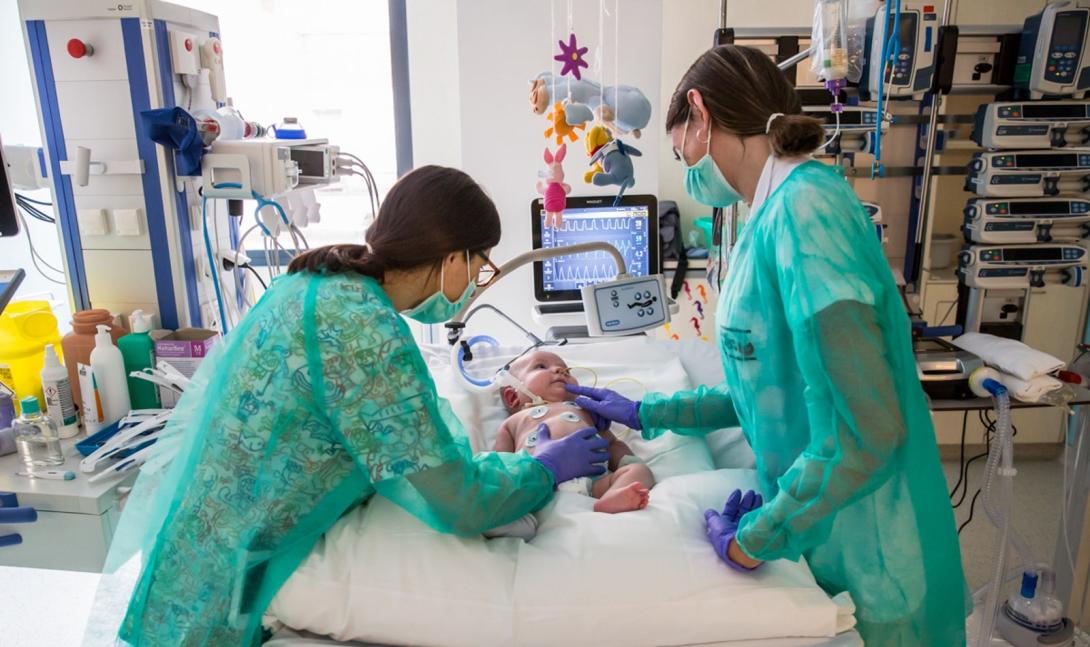
We focus on the comprehensive care of the children and their family in situations where emotional overload can be important
Comprehensive care model
We focus on the comprehensive care of the children and their family in situations where emotional overload can be important.
We offer the following services:
- The Pediatric Intensive Care Unit is open to parents 24 hours a day. The goal is to make the stay of the children and their family as comfortable as possible. To this end, parents are welcomed throughout the day, whenever the family wants.
- Emotional support. All our professionals are trained to respond to the needs that arise in serious situations. We have a team of psychiatrists and psychologists trained to handle the complex situations that arise in intensive care.
- Social work. One social worker is also part of our team. Their function is to offer help to families that require it.
- Spiritual care service. This is integrated into our team to support anyone who may need it.
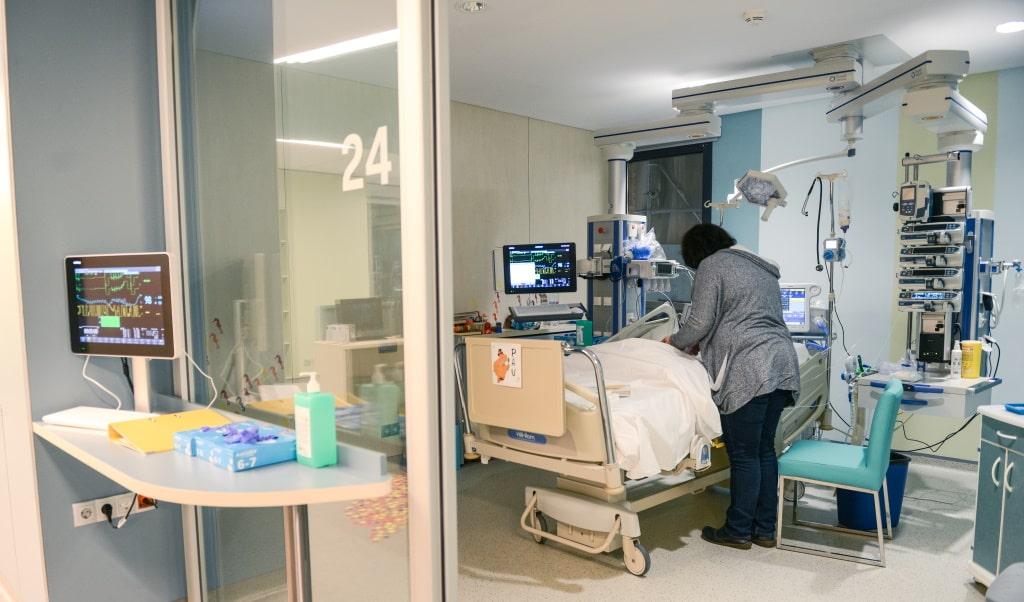
The renovated Pediatric Intensive Care Unit has 24 individual rooms and more than double the space of the old facilities
We improve the comfort of the patient and his family
The renovated Pediatric Intensive Care Unit has 24 individual rooms and more than double the space of the old facilities
Most areas have windows and natural light. A specific rest room has been created for parents with office and personal hygiene area. All the rooms have a bed so that one of the parents can sleep next to the patient. There is space to leave belongings and a television that makes the stay more bearable. Two of the new rooms are positive pressure, for immunosuppressed patients, and one is negative pressure, for patients with highly contagious infections.
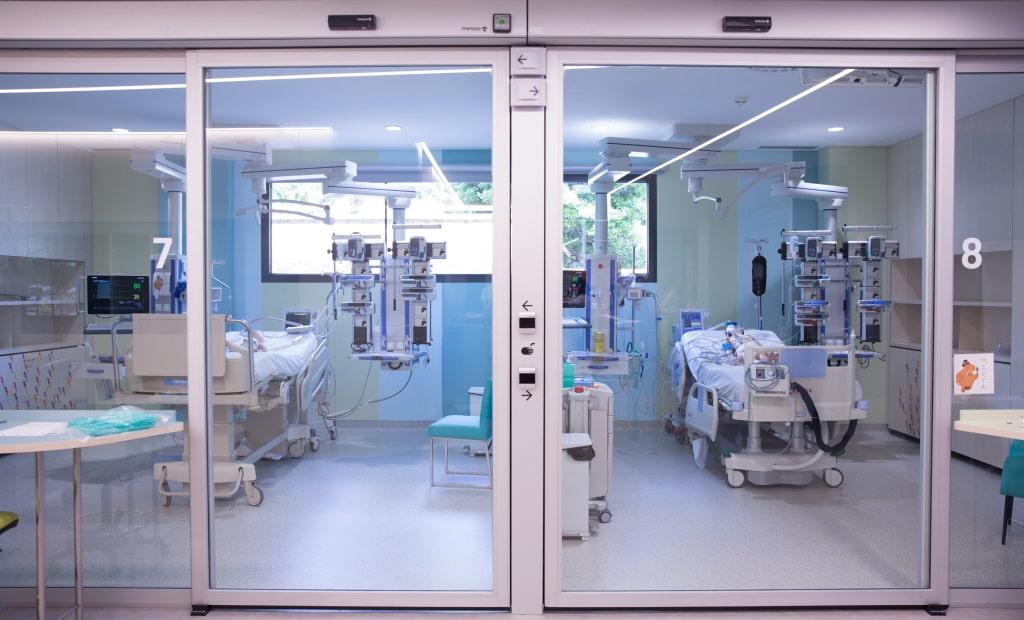
The medical equipment (pumps, respirators, monitors, etc.) is connected in a network to the computer system, which facilitates a remote and uninterrupted control of the critical patient
Technology applied to equipment and assistance
The medical equipment (pumps, respirators, monitors, etc.) is connected in a network to the computer system, which facilitates a remote and uninterrupted control of the critical patient
- The new rooms allow privacy and are connected to permanent monitoring units.
- Continuous monitoring can be carried out thanks to an interconnected system of central monitors, control points at the foot of the bed and mobile devices with real-time data, which allow surveillance when the nurse is not in the room.
- The centralization of data allows everything to be registered in the system, improving security and traeability.
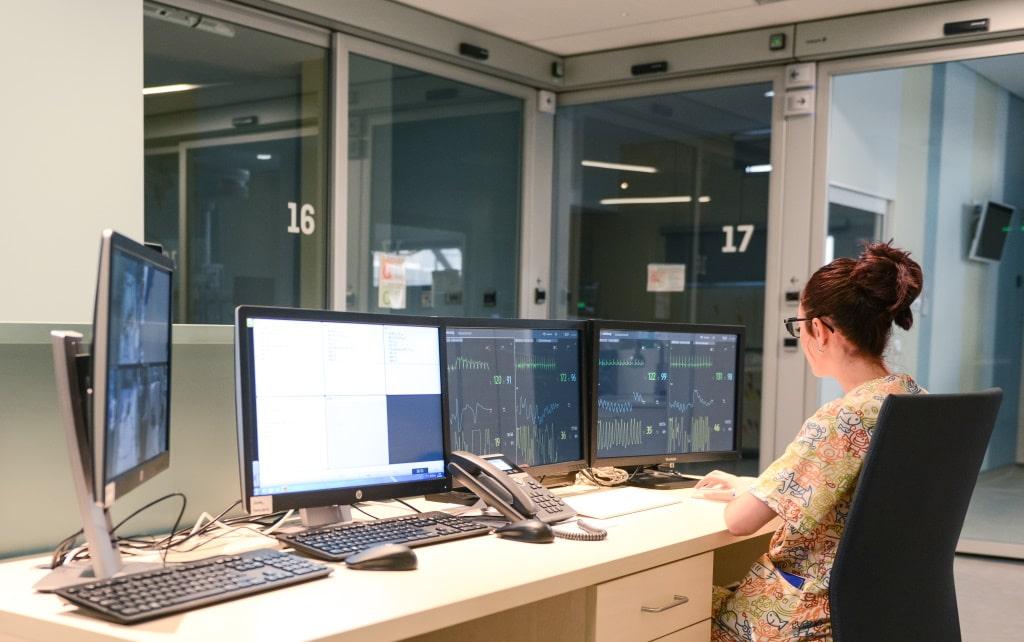
Opinions of families about the Pediatric ICU
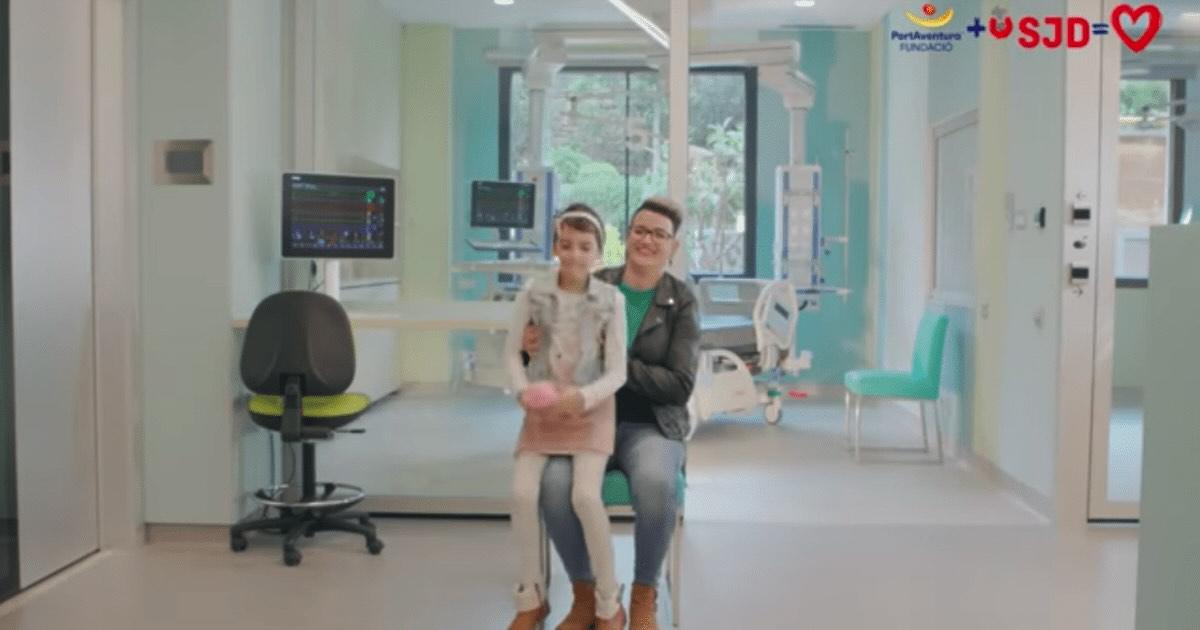
“In the new Pediatric Intensive Care Area you can feel a little like at home, which for children is something very, very important”
Pediatric ICU activity
Children cared per year
Complex surgeries
Patients from other hospitals
Patients referred by pediatrics or specialties
Reasons for admission
Children who require admission to the Intensive Care Unit are those who are in a critical condition. Among the most common cases we treat are the following:
- Patients who develop a serious illness such as meningitis, meningoencephalitis or myocarditis.
- Complex cancer patients.
- Patients with severe trauma.
- Assistance in the post-operative care of highly complex surgeries such as tumour resection or the correction of congenital anomalies, as could be cardiac malformations. Care of kidney and bone marrow transplant patients.
- Illnesses which do not usually require intensive care but which get worse and require monitoring and treatment in the unit. Examples of this include pneumonia or viral infections (e.g., the flu or bronchiolitis). Complications can occur in children without any underlying disease, but they occur more often in patients with heart disease, lung disease, cancer, or other types of problems.
- Children who suffer from chronic diseases and who may be in a serious condition. This is the case of patients with diabetes who suffer acute decompensations.
- Cases of sepsis, a widespread infection that seriously affects children and can be life-threatening. If this disease is diagnosed, which is frequently seen in the PICU, the early prescribing of an antibiotic treatment and admission to the unit markedly improves patient survival.
Our professionals
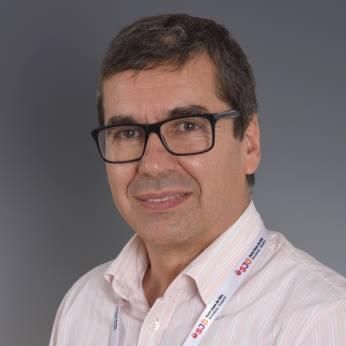




MES team



Investigación
The Pediatric Intensive Care Unit at SJD Barcelona Children's Hospital is participating in several studies and research projects out at the Sant Joan de Déu Research Institute (IRSJD). The goal is to achieve the highest level of quality in the care of our patients. The main areas we research are the following:
- Analysis of inflammatory markers.
- Infectious diseases and sepsis.
- Non-invasive ventilation for critical respiratory patients.
- Treatment of neurocritical patients suffering from encephalitis, metabolic encephalopathies, neuromuscular disease, traumatic brain injury, etc.
- Post-operative care of congenital heart disease.
- Analysis of the comfort needs of our patients and their families through surveys and evaluation of the patient experience. Joint investigation of the medical and nursing staff.
Teaching
SJD Barcelona Children's Hospital is a university hospital affiliated with the University of Barcelona. We share our knowledge and train professionals so that they can specialise in high complexity medicine. Teaching is a fundamental component of the Pediatric Intensive Care Unit, which currently has national and international recognition. Being integrated in a university hospital facilitates the links between medical practice and teaching. We offer:
- Courses on respiratory problems that are organised within the European Society of Paediatric and Neonatal Intensive Care (ESPNIC). High level simulations are performed in which expert teams face highly complex critical situations.
- Specialty training in Pediatric Intensive Care. The programme lasts for two years and is accredited by the Spanish Society of Pediatric Intensive Care (SECIP). Pediatric specialists who have completed their training and have at least one year of seniority may qualify for this training. Enrolment is open.
- Postgraduate training students of the University of Barcelona's School of Medicine participate in internships in our unit: they also receive resident training in the specialty of pediatrics.
- Internal training. All personnel of the unit participate in the simulation of clinical cases that reproduce complex situations. Resident physicians are also trained in the management of common techniques and procedures.
- External training. Theoretical-practical courses organised from the PICU on invasive and non-invasive mechanical ventilation, cardiopulmonary resuscitation, advanced life support to pediatric trauma, ECMO, extrarenal clearance or ultrasound in critical paediatric patients.

